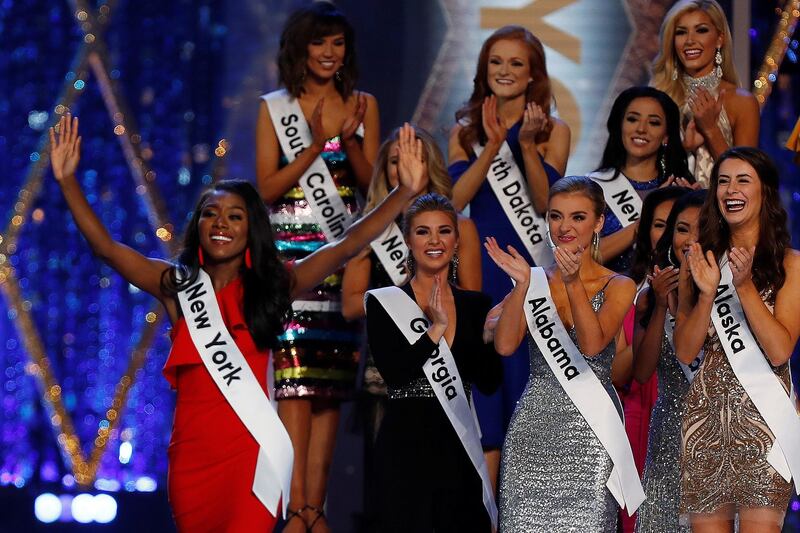Gone are the days when pouting, wearing high heels and wishing for world peace were enough to enter a beauty pageant. The Miss America pageant, which took place this week, has scrapped its swimsuit round and introduced, instead, a round in which contestants are asked for political commentary.
It’s apparently all about brains and charity work now, rather than beauty. And it’s not a pageant any more but a competition.
Kudos to the participants for some thoughtful contributions. Miss Michigan highlighted a fresh water crisis in her local town of Flint, which was already a political firestorm. Miss West Virginia went so far as to say that US President Donald Trump was modern America's biggest problem, a risky move given the competition's nationalistic brand.
It’s clear that many participants in beauty pageants are hugely accomplished and have already done, and will go on to do, incredible things. And many of those future achievements will occur as a result of the platform they gain access to by winning the beauty pageant. That’s true not just of Miss America but also beauty pageants around the world, which continue to be hugely popular with women and viewers – although with no swimsuit round, the viewing figures for this year’s competition appear to have dropped dramatically.
Whatever these pageants call themselves, they are in essence competitions to judge women – and they are still primarily focused on looks. As my young daughter asked with surprise this week, why would you put girls on a stage and then decide who is the prettiest? It sounds ludicrous, even to a seven-year-old. If they didn’t already exist, you wouldn’t invent beauty pageants today.
The history of many pageants includes offering opportunities to women to better themselves. College scholarships were the carrot that once attracted American women to strut their stuff. That's certainly a stereotype that needs challenging – that if you’re beautiful you’re a bimbo. The motivations of contestants are diverse and most are clever and savvy.
What’s also clear is that in a beauty pageant, no matter how many strategies you offer to achieve world peace or encourage female empowerment, it still boils down to just one thing: scoring women. And the crux of it is scoring women in a line-up to determine who is the most pleasing.
___________________________
Read more from Shelina Janmohamed:
[ Steve Bannon shouldn't be given a platform. Those who bear the scars of racism should ]
[ Jamie Oliver's jerk rice debate is far more insidious than it seems ]
[ It is none of Boris Johnson's business what any woman wears ]
___________________________
Instead of “empowering” women, this rating given to them of how delightful they are is marking women by the very standards that serve to objectify women and put a value on them. Instead of challenging inequality, it perpetuates it because it still makes being pleasing something women should strive towards. We need to highlight the hypocrisy. But more than that, we need to find structures to highlight and amplify talent, innovation and creativity.
That’s why the introduction of the political commentary round – apparently groundbreaking because women have opinions; who knew? – is so laughable. When we look at our mainstream politicians and political commentators, most are men. For many women, access is denied. It is only when attempting to be pleasing that they are allowed to have opinions – as long as they are not very controversial ones.
Beauty pageant contestant lists are catalogues of women who have been rejected or dethroned for expressing their own views, which were deemed incompatible with the whole notion of being pleasing.
If we truly want more women to pass political commentary, then let’s not tie it to how they perform on a stage and open the doors to access places that really matter, like the media and politics.
Beauty pageants don’t exist in a vacuum. They are the most high-profile instance of a social construct that gives value to women based on appearance. The currency is still to please.
Being pleasing and non-controversial does nothing to change the system but instead reinforces it. Whatever the claims about beauty pageants reinventing themselves, they perpetuate the structures that make a woman’s looks her real value.
It’s ludicrous that the door women are encouraged to walk through to get access to national platforms, do good and hold opinions is the one that encourages them to please and simper. That door leads nowhere. Instead, if we want real access, it’s time to kick down all the other doors women are locked out of – even if that doesn't seem terribly pleasing or ladylike.
Shelina Janmohamed is the author of Love in a Headscarf and Generation M: Young Muslims Changing the World





